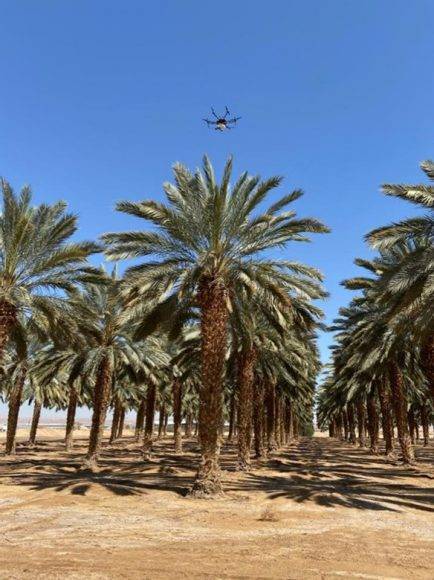
Israel is known for its robust military technology sector, and particularly the use of unmanned aerial vehicles (UAVs), which are specifically engineered for reconnaissance, border control, battlefield surveillance, transporting supplies, and other types of missions.
Blue White Robotics, a startup based out of Tel Aviv and founded in 2017, decided to take the local superiority in the UAV market and give it an Israeli, albeit civilian twist: instead of being used for military purposes, drones could be used to help pollinate dates in the Arava desert.
During its first test in March 2020, four pollination flights were made, one per week, in which drones transported pollen to date palm trees’ flower stigmata, with results showing that 90% of the trees were successfully fertilized.
It has also developed an autonomous shuttle at Bar-llan University, that helps transport students and professors across campus.
When the pandemic hit, the Israeli startup realized that due to Covid-19 restrictions agricultural harvesting was suffering and that the time had come to market to the U.S. and other countries, where growers or laborers dwindled due to the spread of the pandemic.
Entire fields and agricultural crops could be fertilized by drones alone. The company recently raised $10 million to expand its local R&D sector through Jesselson Investment, Peregrine VC, Entrée Capital, and an investment group led by Ran Sarig.
Blue White Robotics promotes robots-as-a-service and has been active in the Bay Area and other farming parts of Northern California, such as Fresno and Bakersfield, where it analyzed the growing need for its product in the U.S. market.
Giving it an Israeli twist on things, the company has plans to bring it to the broader Middle East region. In the wake of the recent peace agreements signed between Israel and some of its Arab neighbours, Blue White Robotics hopes to use its technology to break down cultural barriers and bring economic peace and trade throughout the region.
Blue White Robotics used its technology to pollinate date palm in the Arava region. Photo: Blue White Robotics
Blue White Robotics co-founder and CEO Ben Alfi stated that their vision is to revolutionize all of the aspects of work today and make it entirely autonomous.
Focusing on several segments, and mainly on the agricultural industry and urban mobility. These are two areas that with their capabilities, they feel they can achieve labor independence, improve the efficiency of yields, and make sure all operations rely on autonomous abilities, which are both easy and done in a safe manner.
Blue White Robotics, which is derived from the colors of the Israeli flag. The company has three core values: to encourage fellowship, love of the land, and innovation.
The company has been successful in the U.S. in upstate New York and Northern California and has cooperation agreements with the urban mobility sector in Singapore.
The company’s flagship product is a software platform that enables one person to operate multiple air and ground autonomous vehicles and control them efficiently and safely; while it also provides an operation center, and is able to address grower’s concerns and ensure the efficient operation of all vehicles.
Lastly, it enables a direct connection with customers by providing an end-to-end service including transparency, regulation adherence, and logistic management.
The company is currently in talks with growers in California, to use its drones to pollinate almond orchards. California is one of the world’s largest almond exporters, with sweet almonds contributing to some 80% of the global production.











